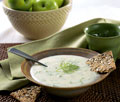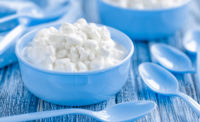
Source: Cabot Creamery

Source: Vogue Entertaining &
Travel Produce Awards
Since early this month we’ve been hearing about the recall of potential salmonella-contaminated hydrolyzed vegetable protein (HVP) manufactured by Las Vegas-based Basic Food Flavors Inc., one of the largest producers of HVP in the United States. HVP is used as a flavor enhancer in many processed foods, including soups, sauces, gravies, seasoned snack foods, dips, dressings and cheese spreads. Already dozens of processed foods containing the company’s recalled HVP have also been recalled, and you can expect many more. TheWashington Postand others predict this could lead to the biggest food recall in U.S. history.
The foods that pose the highest risk are those that FDA calls “ready-to-eat” foods, in other words, foods that have not gone through a “validated kill process.” This includes dairy-based dips and cheese spreads, which are not normally cooked after HVP is added.
For many savory dairy foods formulators, HVP is the secret ingredient that puts the fifth taste - umami - into what is normally a very bland product - milk. Taking its name from Japanese, umami is a taste imparted by glutamate, a type of amino acid, and ribonucleotides, including inosinate and guanylate, which occur naturally in many foods including meat, fish, vegetables and certain cheeses, such as Parmesan. As the taste of umami itself is subtle and blends well with other tastes to expand and round out flavors, most people don’t recognize umami when they encounter it, but it plays an important role making food taste delicious. This is particularly true in dairy-based dips.

Source: National Restaurant Association
Before this month’s HVP recall, the majority of Americans never gave much thought to HVP, in particular since it can be found in products positioned as all natural and even certified organic. In fact, Whole Foods does not object to its inclusion in foods sold through the national retail chain.
According to Wikipedia, HVP is “produced by boiling cereals or legumes, such as soy, corn or wheat, in hydrochloric acid and then neutralizing the solution with sodium hydroxide. The acid hydrolyzes, or breaks down, the protein in vegetables into their component amino acids. The resulting dark-colored liquid contains, among other amino acids, glutamic acid, which consumers are more familiar with in the form of its sodium salt, monosodium glutamate, or MSG.
Interestingly, MSG is considered a food additive, and one that Whole Foods will not allow in products sold in its stores. And though the free glutamic acid present in HVP may join with free sodium in processed foods to form MSG, this potential presence of MSG does not need to be disclosed on labeling. Labeling is only required when MSG is added as a direct ingredient.
Activists in the natural foods industry have long known this and have made an effort to communicate HVP’s secret to consumers. Another hidden source of MSG is yeast extract, which is also found in many so-called “natural” foods, including dairy-based dips.
HVP is in Boca Burgers, which are not part of the recall, but are sold through Whole Foods. As is Follow Your Heart brand Organic Creamy Ranch Dressing, which has been recalled. Imagine the distress of moms nationwide who thought they were only buying the best for their offspring to dip baby carrots and other healthful snacks? Not only will the recall raise concerns about food safety evaluation methods at food processing companies, but it will also have mom bloggers and other food activists pressuring food manufacturers to stop using HVP.
As of March 22nd, 159 products made using the recalled HVP have also been recalled by manufacturers. This includes select varieties of dairy-based dips and cheese breads produced by companies such as The Orval Kent Foods Co., Wheeling, Ill., Emmi - Roth Käse USA, Monroe, Wis., T. Marzetti Co., Columbus, Ohio, and Ventura Foods LLC, Brea, Calif., and sold under brands such as Culinary Circle, Spreadables, Great Value and Dean’s.
For more information, as well as an up-to-date list of recalled products, visit: http://www.fda.gov/Food/ResourcesForYou/FoodIndustry/ucm203201.htm.

